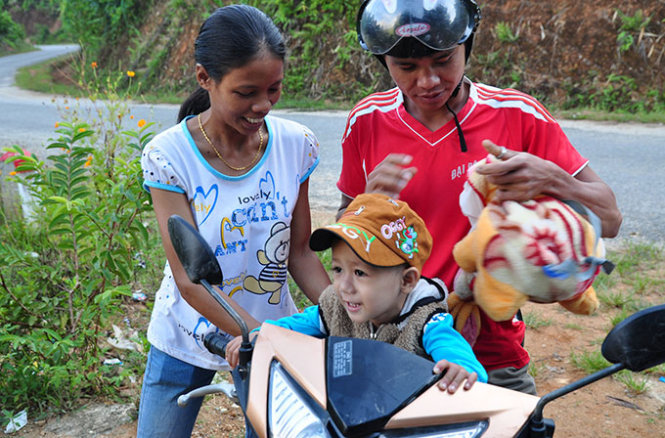A young ethnic minority nurse in central Vietnam’s Quang Nam Province risked her own and her family’s safety to rescue a newborn from being buried alive by superstitious villagers.
In early September 2012, a young woman of Xe Dang ethnic minority in the province’s Nam Tra My District died from birth complications shortly after delivering a healthy baby boy.
Just like many communities of ethnic minorities in Vietnam, residents of Tac Giang Village, nestled halfway to famed Ngoc Linh peak, hurried to bury the woman within the day.
The woman’s husband held back his tears bidding farewell to his newborn, who was to be buried alive together with his deceased wife in compliance with one of the village’s long-standing superstitious practices.
When the villagers were about to put the mother’s body over the baby and fill the grave with dirt, out of a sudden, Ho Thi Hoang, 19, dashed to the scene, nabbed the baby and fled.
Hoang was sent by her elder sister, Ho Thi Hieu, a 25-year-old intern nurse, upon learning of the news.
Leaving behind the villagers’ ill-meaning gossip and even accusations, the two girls bravely took the baby to the district center.
“I didn’t know what to do after rescuing the baby. I had no other choice but to leave my village,” Hieu recalled.
After having the baby’s umbilical cord removed at a clinic, with no money on her, Hieu begged for milk to feed the hungry infant.
The girl and her baby stayed at a room at a café in the district center, where she would cover 13km to her workplace every day.
With her intern monthly salary of merely VND500,000 (US$26), Hieu did all kinds of work including collecting scrap, peddling ice cream and making rice wine to provide for the infant.
She named the little boy Ho Quoc Khanh, with Ho being her ethnic community’s common surname, and Quoc Khanh meaning National Day to mark his date of birth on that day.
Hieu didn’t mind if no men were willing to marry a young woman with an adopted baby.
Some time later, a young man of Co Tu ethnic minority from another district learned of Hieu’s story.
Filled with respect for the girl’s courageous act, he came to see her and later proposed to her.
The little boy, now 2 years old, is learning to speak his first words in Kinh language - the official language of Vietnamese people - and his adopted parents’ two dialects.
Hieu now works as a nurse at a local clinic, and the three live happily together.
She sometimes visits Khanh’s biological father and siblings, whom she will let her adopted son return to when he grows up.
“In 2010, a newborn was also buried by my villagers in a similar circumstance. Tragically, the infant had died when I arrived. When I was a child, my parents would tell me about how newborns were buried alive by superstitious villagers. I have since vowed to do something to help them someday,” Hieu shared.
Ho Quang Buu, chair of the district’s People’s Committee, said that one of his priorities is raising locals’ awareness and persuading them to give up such superstitious practices as burying living newborns.
However, treacherous terrains and inconvenient transport have been a major hindrance, he added.
Like us on Facebook or follow us on Twitter to get the latest news about Vietnam!



















































